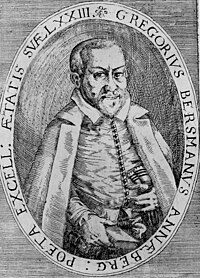Gregor Bersman
Gregor Bersman, also Bersmann Bersmanus (born March 10, 1538 in Annaberg , † October 5, 1611 in Zerbst ) was a German philologist and Latin poet.
Life
Bersman's father was the head of the Annaberg poor fund, and he lost his mother when he was a child. In 1549 he attended the Meißner Fürstenschule St. Afra , where he was particularly encouraged in Latin poetry under the rector Georg Fabricius . In 1555 he enrolled at the University of Leipzig to devote himself to philological and medical studies. He got to know Joachim Camerarius the Elder , who motivated him to publish his poetic works and to give samples of his Latin rhetoric. After earning his master's degree in 1561, he went on study trips to Strasbourg , France and Italy .
In Padua and Bologna he enjoyed the lessons of the most important humanists and, through his friendship with Johannes Posthius , gained insight into the working methods of the doctors there. In the late autumn of 1564 he went to Wittenberg , from where he was appointed to a teaching post in Schulpforta in 1565 . In 1568 he returned to Wittenberg, where he met resistance with his psychological lectures as a professor of Melanchthon's "libelli de anima" . In 1571 he followed a call to Leipzig as a professor of poetics and in 1575 moved to the professorship of ancient languages and ethics as the successor to his former sponsor. In the same year he married Magdalene Helbdorn.
Since in 1580 he joined the group of those who refused to sign the formula of the Concord , he was dismissed from his office in the dispute over Calvinism and expelled from his home and town. In 1581 he received an offer as rector of the Francisceum high school in Zerbst. On January 30, 1582 he took office and administered it until his death. Initially, he made great contributions to the institution and insisted on a friendly relationship among his teachers. With increasing age, which was accompanied by deafness, his efficiency for the institution decreased more and more.
Bersman is portrayed as an irritable and violent spirit who also had to cope with many imponderables in the private sphere. He went down in literary history primarily as a Latin poet. His work spans song-like hymn poems and the forms of humanistic classicism (elegies, epigrams, eclogues). In addition, he has dealt with the ancient authors and edited academic declamations and textbooks in the footsteps of Philipp Melanchthon .
Works
- Orationes duae, ... una, de cura loquendi, qui est delectus verborum, et usurpatio sermonis proprij, ... altera, de fructu et utilitate philosophiae moralis ... Rhamba, Leipzig 1576
- Poemata in libros duodecim divisa. Leipzig 1576. ( digitized version )
- Virgil 1581, 1588, 1596, 1616, 1623
- Ovid's entire poetry 3 volumes 1582, 1589, 1596, 1607,
- Lucan 1589
- Horace 1602
- P. Virgilii Maronis Georgicorvm, Post Omnes Omnivm commentationes, non contemnenda enarratio . 2 volumes 1586–88. ( Digitized volume 1 )
- Auctariorum libri duo . Leipzig 1581. ( digitized version )
- Paralipomenon Iibri duo . Quorum primus et votorum nuptialium, secundus miscellaneorum. Zerbst 1585. ( digitized version )
- Poematum ... in partes duas tributorum. Ed. secunda. Leipzig 1592
- Erotemata dialectides Philippi Melanchthonis Ccollectaneis novarum quaestionum ex Aristotelis aliorumque virorum doctissimis scholis, illustrata ac locupletata . Schmidt, Zerbst 1593.
- Dialectices 1593
- In… Ciceronis… orationes XVII… commentarii…. Zerbst 1611
- Collection of commentaries on 18 speeches by Cicero, 2 volumes 1611
- Poems and speeches edited by Janus Gruter in Deliciae Poetarum Germanorum. Frankfurt / Main 1612
literature
- Joachim Castan: Higher Education and Reformed Confessionalization. The Illustre Grammar School of the Principality of Anhalt in Zerbst, 1582–1652 , Halle: Mitteldeutscher Verlag 1999 (= Studies on State History, 2) [about Bersmann from p. 55]
- Friedrich August Eckstein : Bersman, Gregor . In: Allgemeine Deutsche Biographie (ADB). Volume 2, Duncker & Humblot, Leipzig 1875, p. 507 f.
- Literature Lexicon by Walther Killy Volume 1 Page 473
- Wolfgang Klose: The Wittenberger Scholar's Studbook: the studbook of Abraham Ulrich (1549–1577) and David Ulrich (1580–1623) , Halle: Mitteldt. Verl., 1999, ISBN 3-932776-76-3
Web links
- Claudia Lehmann: Bersmann (Bersman, Bersmannus, Bersmanus), Georg (Gregor, Gregorius), in . In: Institute for Saxon History and Folklore (Ed.): Saxon Biography .
| personal data | |
|---|---|
| SURNAME | Bersman, Gregor |
| ALTERNATIVE NAMES | Bersmann Bersmanus |
| BRIEF DESCRIPTION | German philologist and Latin poet |
| DATE OF BIRTH | March 10, 1538 |
| PLACE OF BIRTH | Annaberg |
| DATE OF DEATH | October 5, 1611 |
| Place of death | Zerbst |
